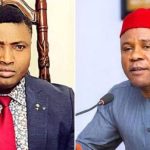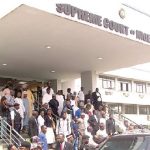Nobel Laureate, Professor Wole Soyinka, has backed a recent claim by former President, Olusegun Obasanjo, that Nigeria is becoming a failed and divided state under President Muhammadu Buhari.
KanyiDaily recalls that Obasanjo had recently attacked Buhari, saying he has never seen Nigeria so divided like this, adding that many of the problems plaguing the country today were due to the recent mismanagement of Nigeria’s diversity.
But the presidency reacted to the comment by describing Obasanjo as a “Divider-in-chief”, accusing the ex-president of “attempts to divide the nation while President Buhari continues to promote nation building and the unity of Nigeria.”
Soyinka in a statement on Tuesday, September 15, 2020, said though he’s not a fan of Obasanjo, but admitted the former President read the current state of the nation rightly.
In the statement entitled, “Between dividers-in-chief and dividers-in-law”, Soyinka described Obasanjo, as “co-architect of the crumbling edifice that is still generously called Nigeria”, for speaking out on the state of the nation.
He, however, insisted that Nigerians no longer have hope in the President Buhari-led government as one that is genuinely committed to the survival of the nation as one.
According to him, Nigerian citizens no longer believe that the current administration understands the minimal requirements for positioning the country as “a modern, functional space of productive occupancy.”
“I am notoriously no fan of Olusegun Obasanjo, General, twice former president and co-architect with other past leaders of the crumbling edifice that is still generously called Nigeria. I have no reasons to change my stance on his record,” he said.
“Nonetheless, I embrace the responsibility of calling attention to any accurate reading of this nation from whatever source, as a contraption teetering on the very edge of total collapse.
“We are close to extinction as a viable comity of peoples, supposedly bound together under an equitable set of protocols of co-habitation, capable of producing its own means of existence, and devoid of a culture of sectarian privilege and will to dominate.
“The nation is divided as never before, and this ripping division has taken place under the policies and conduct of none other than President Buhari – does that claim belong in the realms of speculation?
“Does anyone deny that it was this president who went to sleep while communities were consistently ravaged by cattle marauders, were raped and displaced in their thousands and turned into beggars all over the landscape?
“Was it a different president who, on being finally persuaded to visit a scene of carnage, had nothing more authoritative to offer than to advice the traumatised victims to learn to live peacefully with their violators?”
“And what happened to the Police Chief who had defied orders from his Commander-in-Chief to relocate fully to the trouble spot – he came, saw, and bolted, leaving the ‘natives’ to their own devices. Any disciplinary action taken against ‘countryman’?
“Was it a spokesman for some ghost president who chortled in those early, yet controllable stages of now systematised mayhem, gleefully dismissed the mass burial of victims in Benue State as a “staged show” for international entertainment? Did the other half of the presidential megaphone system not follow up – or was it, precede? – with the wisdom that they, the brutalised citizenry, should learn to bow under the yoke and negotiate, since “only the living” can enjoy the dividends of legal rights?”
Commenting on the listing of Buhari’s achievements by the presidency, Soyinka said it is the norm for any government to record any feat. He added that Nigerians have lost hope and trust in the government.
According to him, “it takes real genius to succeed in spending four years actually doing nothing. What it fails to do, or what it does wrongly, deceitfully or prejudicially is what concerns the citizenry”.
“To reel off any achievements of a government – genuine or fantasised, trivial or monumental – is thus to dodge the issue, to ignore the real core concerns. No government, however inept, fails to record some form of achievement – this was why it were elected,” he said.
“What it fails to do, or what it does wrongly, deceitfully or prejudicially is what concerns the citizenry. Across this nation, there is profound distrust, indeed abandonment of hope in this government as one that is genuinely committed to the survival of the nation.”
“National divisiveness? Just where does culpability lie? Does centralist usurpation divide or bind? The answer is obvious in daily effects.”
Meanwhile, the Minister of Information and Culture, Lai Mohammed had also insisted that President Buhari prevented Nigeria from becoming a failed state when he assumed office in 2015.






![Portable Fights With Nigerian Man At Shopping Mall In Canada [Video] 7 Portable Fights With Nigerian Man At Shopping Mall In Canada [Video]](https://media.kanyidaily.com/2024/11/23120451/portable-150x150.jpg)

![VeryDarkMan Accuses Access Bank Of 'Stealing' Late Customer's Over N500 Million [Video] 11 VeryDarkMan Accuses Access Bank Of 'Stealing' Late Customer's Over N500 Million [Video]](https://media.kanyidaily.com/2024/11/23092706/VeryDarkMan-Access-Bank-150x150.jpg)


![Senator Ifeanyi Ubah Buried Amid Tears In Nnewi, Anambra [Photos] 17 Senator Ifeanyi Ubah Buried Amid Tears In Nnewi, Anambra [Photos]](https://media.kanyidaily.com/2024/11/22181108/Ifeanyi-Ubah-150x150.jpg)




